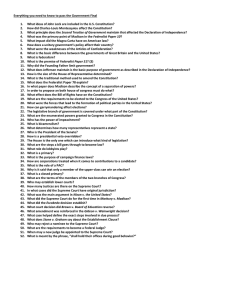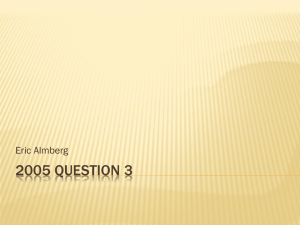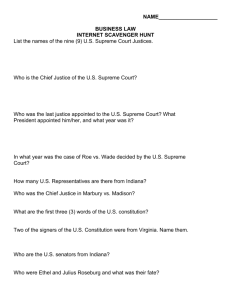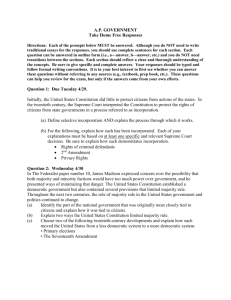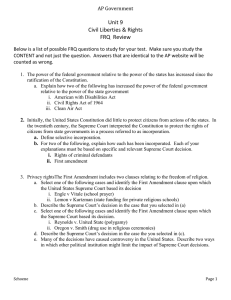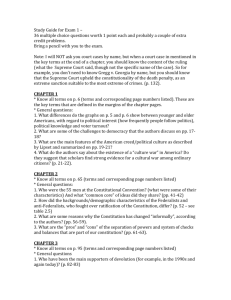We the People notes taken by Emily Wegner
advertisement
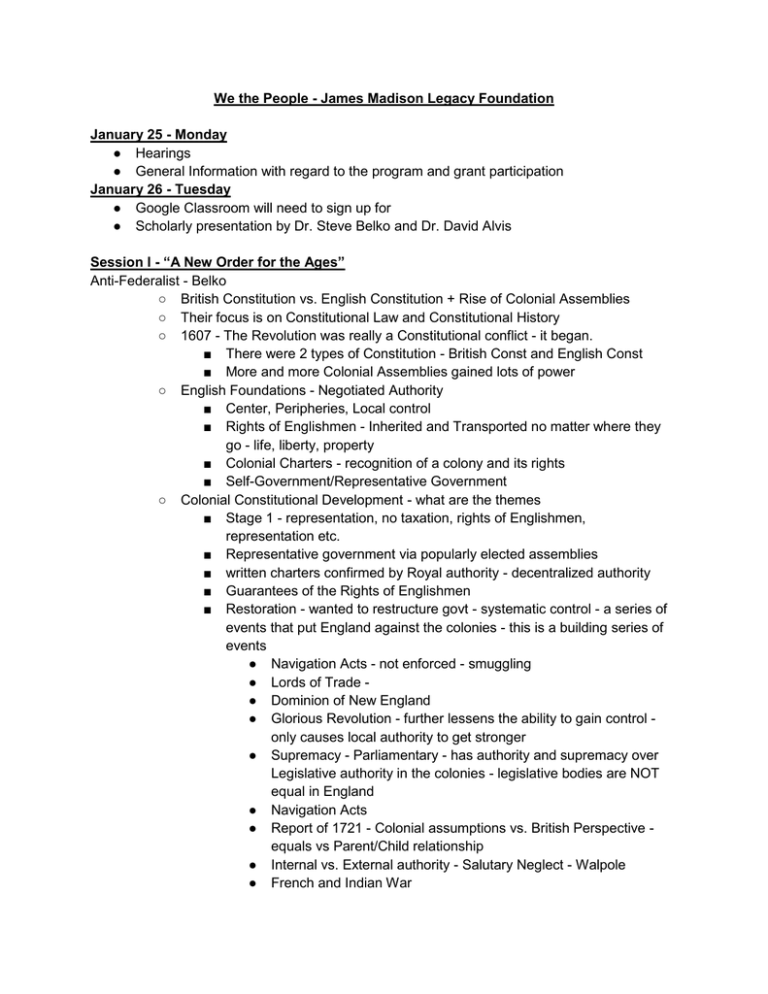
We the People - James Madison Legacy Foundation January 25 - Monday ● Hearings ● General Information with regard to the program and grant participation January 26 - Tuesday ● Google Classroom will need to sign up for ● Scholarly presentation by Dr. Steve Belko and Dr. David Alvis Session I - “A New Order for the Ages” Anti-Federalist - Belko ○ British Constitution vs. English Constitution + Rise of Colonial Assemblies ○ Their focus is on Constitutional Law and Constitutional History ○ 1607 - The Revolution was really a Constitutional conflict - it began. ■ There were 2 types of Constitution - British Const and English Const ■ More and more Colonial Assemblies gained lots of power ○ English Foundations - Negotiated Authority ■ Center, Peripheries, Local control ■ Rights of Englishmen - Inherited and Transported no matter where they go - life, liberty, property ■ Colonial Charters - recognition of a colony and its rights ■ Self-Government/Representative Government ○ Colonial Constitutional Development - what are the themes ■ Stage 1 - representation, no taxation, rights of Englishmen, representation etc. ■ Representative government via popularly elected assemblies ■ written charters confirmed by Royal authority - decentralized authority ■ Guarantees of the Rights of Englishmen ■ Restoration - wanted to restructure govt - systematic control - a series of events that put England against the colonies - this is a building series of events ● Navigation Acts - not enforced - smuggling ● Lords of Trade ● Dominion of New England ● Glorious Revolution - further lessens the ability to gain control only causes local authority to get stronger ● Supremacy - Parliamentary - has authority and supremacy over Legislative authority in the colonies - legislative bodies are NOT equal in England ● Navigation Acts ● Report of 1721 - Colonial assumptions vs. British Perspective equals vs Parent/Child relationship ● Internal vs. External authority - Salutary Neglect - Walpole ● French and Indian War ● Crown + Parliament - based on theory only vs. Colonies - based on years of practice and precedent -Federalism is necessary but local control only makes sense ■ There were always attempts for create a federal idea - it was how the British Empire worked from the beginning up until the Revolution. Philadelphia was not the first attempt. ■ Limitation - via consent and Rule of Law Federalist - Dr. Alvis - Lincoln’s Fragment on the Union ● How do you explain the relationship of the principles of American Politics (Declaration) to the institutions of government in American Politics (Constitution)? ● Significance of Lincoln’s Fragment? ● Myths - there is value in the myths - In a way, the part of the study of the past there are historical facts, but also myths that help us to understand who we are and what our history means. ○ Redefining the “Revolution” - was it really revolutionary? They were fighting for rights as Englishmen - not very revolutionary….especially when you compare it to other Revolutions - French Revolution, Bolshevik Revolution, etc. ■ Declaration of Independence ● The King gets the blame but historically the arguments were against Parliament. Why? ● Inconsistencies - you have to almost edit the text - all men, all white men, all white men with property, etc. ● Should we rename the Revolution to something more mundane like the War for Independence…. ■ Like a child growing up - Albany Plan - moderate proposal for a confederation - always told NO ■ Americans change views ● Otis - No Taxation without Representation ● Delaney - Internal vs. External Taxes - these things don’t agree ● Bland - Sovereign in our own lands ■ England in the Wake of Glorious Revolution ● Feudal Order ○ Hereditary monarchy ○ Landed Aristocracy ○ Anglican Church ○ House of Commons ○ Religious Toleration ● Deposition of James II ○ Tories - divine right of kings - and Whigs - proparliamentary - didn’t agree but both didn’t like the king ○ John Locke and Radical Whig - emerging middle class cities - argued that govt is founded on the consent of the governed - we proved that when we got rid of James II. If we don’t like a ruler then you can get rid of them. ■ ■ ■ ■ This can lead to an unstable monarchy - get rid of hereditary monarchy ■ Colonies - and other parts of England - are watching - they might see this and might start pushing the argument of consent of the governed ■ You would also have to get rid of the hereditary class of parliament - House of Lords ■ House of Commons - based on charters given by King - not based on population - this would need to go too - this doesn’t fit with the idea of the consent of the governed ● The Crown and Parliament can pass any law that does not violate the laws of God - do not question - Declaratory Act 1766 ○ The Americans refuse to not ask questions ○ They are well read - influenced by Enlightenment ○ Otis - No Taxation without representation - you are essentially stealing our property - that makes us a slave. ■ We had Colonial Agents (Lobbyists) - but they were not elected ■ England could have given us a couple of representatives and simply outvoted them in every election ■ Couldn’t really do this because to say yes would create disorder that would cause the Empire to fall down - unequal representation in England and elsewhere ○ Delaney - Internal vs. External Taxes - we need England to regulate trade in the Caribbean, but we don’t need them for internal governance - they can’t plunder us to pay for their debts. ○ Declaratory Act 1766 ○ Townshend Revenue - 1767-1770 - British Claim it is an external tax ○ Bland - principle of natural justice - British shouldn’t tax us because they are too far away - we are sovereign in our own lands...but we are still Englishmen…. So how does this lead to the King being the bad guy - Jefferson claims he should Veto any laws passed by Parliament that are violations and he doesn’t do it. Consistent argument by the colonists - consent of the governed - and Britain simply cannot accept this. Side note - voting and property rights - those with the property were able to vote - justification for women not voting Break Session II - A Frame of Silver - Republicanism and Union Federalist - Alvis ● How is the constitution designed so that it complements our principles? ○ Lincoln and his Frame of Silver ○ What really makes the Am Rev Revolutionary is this idea that the government is based on the consent of the governed - arguments between America and England ○ The first trial we have of this is the Articles ■ Problems - (James Madison’s writing on its deficiencies) - this is reminiscent of the Rotten Boroughs of England - grossly unbalanced “districts” where small populations could outvote large populations ● regulating interstate trade (keeping navigable waterways open), ● with no central government each state could impose taxes for imports, ● no power to collect taxes, ○ states wanted to keep money close to home - more loyalty to the state than to the central government ○ How do you assess property? ○ How do you divide up the taxes between the states? ● No executive, only a leader of the continental congress and temporary appointments for executive and judiciary ● Representation - one vote regardless of size - and 9/13 states for a vote, and 13/13 to amend the Articles ● No ability to raise a national army - must rely on the state militias no substantial body of troops to rely on ■ Madison - the only way to deal with these issues is to make sure you have a way to deal with factions and control of the majority ● Federalist 10 - big vs. small ○ How you want to think about government in light of human nature ○ Factions - how do you have a democracy (majority rule) and still have individual rights. ○ How do you deal with human nature without getting rid of human things ○ How does the constitution deal with human nature - how can we make factions less intense - expand the factions and make them compete and then one cannot overshadow another ● Federalist 51 - separation of power Anti-Federalist - Articles of Confederation - Belko ● Articles of Confederation - ○ ○ ○ Successes - it secured our independence, Treaty of Paris (1783) - land from Great Lakes to Gulf of Mexico, Ordinances - system of land surveyance Northwest ordinance to add states to the union, etc. Point of interest - Federalists vs. Anti-federalists - Elites vs middle class ■ Who is getting something out of this? Articles was more beneficial to the middle class. They were thrown out because the Federalists weren't making money...the Federalists won… ■ Put things into perspective - A New World Government - House and Senate - Executive, Judiciary - draft of the new “Constitution” - all he did was take the Constitution and apply it to the world. ● You have to get us out of the mindset of now and then - try to get students to think about how the people of the time would really feel about the “Constitution” Anti-federalists - one theme from them = consolidation - feared central government would get so big that they would consolidate all power at the central level and the states would lose power. ■ Brutus No. 1 ■ Feared “Necessary and Proper” Clause ■ Taxation - will be the tool they use to go after the power…. ■ Representation ● Must have confidence, respect, and affection of the people for any central government to be successful….is that working for use today? Not really ■ Undemocratic ● Claimed the Constitution to be undemocratic - it is distant, removed, misrepresents to population - Session III - The Judiciary and Judicial Review Anti-Federalist - Belko ● No Check on the Judiciary - ultimate symbol of power/tyranny ● Types of Judicial Review ○ Not afraid of the National Judiciary declaring congressional laws unconstitutional ○ Very afraid of National Judicial overturning state laws and declaring state laws unconstitutional ● Expand the Power of National Government via Construction ○ beholden to no one - they don't’ represent us - consolidation and centralization ● Anti-federalists - really didn’t have anything against a national executive - he executes the laws ○ Jackson upsets this - Imperial Presidency - Jacksonian Democracy ○ Imperial Presidency - anti-federalists predicted this - there would be so much power in one individual that they are in essence a monarchy Federalist - Alvis ● Article III ● ● ○ Judicial Power and the Convention Debates ○ Appointment of judges ○ Inferior Tribunals ○ Jurisdiction of the Courts Hamilton - Fed 78 - Lack of Faith Must defend why you would give someone lifetime tenure ○ unique role of the judiciary in republican government ○ Written constitution - how do you make sure the rule of the game are enforced judges...elected officials would be biased to advance their own power ○ If all problems come from Majority Rule (Fed 10 ) then how do you find someone who do not respond to the majority? Thus lifetime appointments - there is no other choice if you want someone to defend the constitution ○ Hamilton does not believe the fears of Judicial Review by the Anti-Federalists are ungrounded ■ Judiciary is the least dangerous...is this true? ■ What happens if someone does not choose to enforce their decisions? ● The President has the army ● The Congress has the purse ● What does the Judiciary have? ■ The biggest threat to limited Government is the people themselves human nature - they always want more ● in order to limit our desires and ambitions we must have something in place to do so ● Legislature is responsible for the expanded role of federal power not the courts ■ If you look at it , what the majority wants is not necessarily what the people want ● Majority is a temporary group of people who wins a vote at one time ● The “people” is much bigger than this - the power of the people is superior to both legislative and judicial power (pg 49 Fed 78) ● You must have judges who will enforce the will of the people rather than the will of the majority ■ How do you get good judges? Elected vs Appointed ● How do you get people who are qualified for the job when you know you can’t pay them. ● You must make it a lifetime appointment or you will only get unqualified people who couldn’t make it as lawyers Q & A - Debrief ● Could the Articles have gotten us to the place we are today? ○ Belko - I don’t deal with ifs or buts….we simply don’t know ■ it’s about ideological perspective - depends on the perceptive ■ Role of Consolidation - there is nothing wrong with having an overseeing body if it’s really representative of the people - make sure everyone has their say ○ Alvis - Belkos argument makes sense but it’s wrong…. ■ Would we be as great a nation? No. Name an existing Confederacy….there isn’t one - they all doe for the same reasons - the autonomy of the sovereign parts cannot work together and survive - not a sustainable model. ● Federalists - new argument - you can be big and still be a republic…. ○ Belko response - he does not believe we live in a republic or a democracy. He does not trust centralization in any form - local, state, or federal General Comments ● We must make sure to keep things into perspective ● What is the context of the time and how do we keep this in mind when we discuss the Federalists and Antifederalists with our students ● The Bill of Rights did not apply to the states until John Marshall - individual states had a Bill of Rights ● What does protecting the majority mean? - Belko sees it in terms of economics wealthy vs. middle class ● both groups believe in protecting individual rights - they simply disagree on how to do it The Missouri Plan ● Nov 5, 2015 - 75th anniversary nonpartisan court plan - has been copied by over 36 other states ● Info on the history of the MO Plan - website explain it all ● Eligible for schools ● Every Missourian every 2 years votes for nonpartisan judges ○ Get to test drive Judges …. we get to vote to retain or not retain judges. February 15 - Monday ● Announcements ● Meeting with Mentors about implementation of the We The People Program ○ ● ● Round table rotations to learn how each mentor has made the program work for them. ■ Trish (Jefferson High) - pre-reading and questions as the chapter opener. Can’t get through the entire Level 3 book in one year - not with including current events and government. 6 teams - one for each unit - in each class. A great opportunity for assessment and community involvement. Show me Constitution is a great way to do the questions/hearings on a smaller scale and still cover the material. It takes a lot of outside research to answer the questions and she has a cheat sheet to help guide them. Uses Street Law to help guide them as well. ■ Ken (Westminster) - Students who have difficulty reading, there are options online. You can blend Level 2 and 3 to fit the needs of your students. You can infuse the material into existing units with a traditional text or you could use the We the People book as a main text stand alone. There is a lot of flexibility and it’s not intimidating to the students. Students enjoy the structure and approach. It is important to do some form of assessment - working together, researching, articulating the information, etc. It allows all students the opportunity to succeed. Only uses the text to get the information initially - only add other research and materials as you feel comfortable. ■ Crystal (Pier City by Joplin - 200 students in High School)- We the People is a supplement to McGruders - would use strictly We the People if it was an option. Uses all Levels for students. At the end of the year the students are put into teams of 4 and they have to pick a question from the book - spend a week to prepare their presentation, spend a week practicing in class, after the EOC community members are invited to the hearing. Differentiation is very easy for this approach - assigns questions to certain students based on ability. ■ Don (Arcadia Valley - small rural school) - uses Level 2 - use the book sto structure the course and supplement with other things. 1st semester We The People - foundations and political parties - 100 points for the test and 100 points for the hearing. Begin preparing for hearings after Thanksgiving. Uses community members to judge the hearings. The hearings are not so much about testing constitutional knowledge as it is teaching skills. Spend a lot of time practicing the prepared statement and getting them ready for the question/answer part of the hearings. 2nd semester is the other government curriculum. Bill of Rights - uses a lot of court cases to teach. ■ Marcus (Columbia) Break Millie - General Info ○ http://missourilawyershelp.org/educational-resources/ - ● ● ○ Lesson Plans - http://missourilawyershelp.org/lesson-plans/ - ○ Teaching the MO Constitution - 1 day intro workshop for 60 teachers. Russ S. This might be a great opportunity to learn more . Charlie (Charles) Hinderliter - The Bill of Rights: The Debate, Incorporation, the Role of the 14th Amendment ○ Been involved in We the People since 1996 in some capacity ○ Legacy of the program - impacting how people operate as citizens - educated and informed voters, use the knowledge gained to make informed decisions.\, etc. ○ Origin of the Bill of Rights ■ ■ ■ ■ General Thoughts ● We draw a lot from Britain - structure, philosophy, etc - adapting old laws to new principles ● impose more modern ideas on older documents - this is what we do not - apply the ideas of the BOR to the states. ● Constitutionalism is a core piece - people in a state of nature (Locke) who band together to build a constitution for the good of all. ● Founding Fathers - they were human - they were politicians. Take this into account when you teach this Convention (Unit 2) ● Mason and Gary - they proposed a BOR - voted down (perhaps because they didn’t view is as important). This will become one of the biggest areas of disagreement Debates - Fed/Anti-Feds (Unit 2) ● Not political parties - not that organized. Vote Yes or vote No on the Constitution. They are not homogeneous groups ● Political fight - AF - Phili Convention done is secret...however, it was just how things were done - biggest argument was the lack of a Bill of Rights ● only ½ the states had a BOR - F counter argument ○ No core set of principles in these - they were all different ● F - a Const of enumerated powers - they can only do what it says. if you add a BOR it might give congress ideas about powers they don’t really have ● F - the Const is a BOR - it is designed to limit the Government and does not have the power to abuse power anyway ○ Focus on Article 1 Section 9 - Ex Post Facto Laws - after the fact ○ They looked at what tyrannical governments had done in the past and decided what they wanted to prevent. The Constitution did this ● F - BOR only needed between king and and the governed - not needed with a social contract ● Madison - concerned they would only be words on a page with no real force - What will give it teeth? ● AF - generally had stronger arguments - protection of people’s natural rights - Locke - give up liberties to protect rights. Protection from each other and the government - this is the function of government… perhaps a BOR is necessary ● AF - Old Whig - this is an original contract ● AF - Brutus - if you don’t list them, are you surrendering them? Ratification (Unit 2) ● Need 9/13 ● ● ● ■ The first few states were easy Major fights - RI, NY, Massachusetts - when their convention meets, they ratify it but create a list of amendments - 7 other states follow suit. ● ACTIVITY - Groups to look at ratification docs with lists of proposed amendments ○ Look for Themes and what made it in ■ 1st Amendment, State Power, Standing Army, Dec of Indep into law rather than theory, Religion, Due Process, Separation of Powers, Federalism, Rights of Accused, Sovereignty, Representation, taxes (on imports and direct taxes - how to do it?) ■ Some State Amendments were very detailed while some were very general ■ Small States vs. Large States - there is a difference in what they focused on and wanted. ■ Some things were almost prophetic ■ Each state liberally borrowed from the others with regard to their Amendments ○ What didn’t make it in? ■ Poll Taxes, term limits - for all offices, direct restriction of Judicial power, ○ Points of interest ■ How do you collect revenue to pay debts and how do you regulate commerce ■ 9/13 to ratify - what happens to the other 4 if they dont? Peer pressure? By a certain time, really everyone is in and RI and NC don’t really have much choice. Unity was a major factor in ratification Impact on 1st Congressional Election (Unit 2) - Madison vs Monroe ● 1788 - 9 states have ratified so we know it will be ratified President sworn in and a Congress will be selected. How will the elections take place? ● Madison the Politician (rather than the scholar as we usually see him) - fall 1788 battle between Madison and Patrick Henry (AF proponent of State Sov) - 2 major figures in the VA Ratifying Convention ○ Henry - very much against the Const - fiery and brash ○ Madison - in favor of the Const - soft spoken, rational, logical, detailed ● VA - has to set up congressional districts - Henry sets them up against Madison (gerrymandering) ● Anti Feds chose Monroe to run against Madison ● ■ ■ Campaigns - very different from what we have now. Publicity for this race in a time that that just wasn’t done. Symbolic victory if the Anti Feds can keep one of the major writers of the Constitution out of the first Congress. ● The two men were actually friends and got along quite well - their friends were another matter. They bent the truth and at times told out-right laws. ○ Not true - Madison was completely opposed to a BOR - he had changed his perspective ● Madison wins - by 336 votes - 15 point spread - 57/43 vote. Without Madison, would this have happened? Want the BOR to happen but wants to make sure it does not go crazy - actually be for the benefit of the country. Madison’s efforts to create the BOR (Unit 2) ● He spend the last year arguing we didn’t need one - why the change? ● Very few Anit-Fed Congressmen - their priority will not be Amending the Const - focus will be on: court system, revenue, executive departments (cabinet), regulation of commerce, etc. Need to fix the defects of the Articles ● Goals ○ Positive change to the document ○ Avoid structural changes proposed by several of states don’t make it worse ○ Make the Anti-Fed argument go away - get a BOR and avoid a Constitutional Convention as proposed by VA and RI ● Narrows down over 200 suggestions to 19 amendments proposes to Congress in June 1789 - goes to house and committee - 7 of the 19 make it out of committee. Senate - no records were kept - but we do know 12 made it out of committee the two forms didn’t agree - Conference Committee to work out the differences. 12 Amendments sent to the states for ratification - 3/4th (11 States) ○ Failed - Representation based on Population, Congressional Salaries (now 27th Amdt) ● Takes almost 2 full years for the BOR to go through the process ● After they pass they are not really relevant until after about 100 years. ● Only case where the BOR was used to strike down a law was Dred Scott...hummm Incorporation Doctrine (Unit 4) ● Focused on restrictions of the Federal rather than state ● ■ Madison’s original 14th Amdt - focused on the limits of State power - no State shall ● Many incorporation cases overruled previous cases ● Consistent ideas behind this process but there is no easy process - it is evolutionary ● A difference of opinion ○ it shouldn’t be incorporated ○ it should be on a case by case basis ○ it should be incorporated ● Barren vs. Baltimore 1833 ○ 5th amdt right of just compensation - Baltimore has taken his business due to silt buildup in the port ○ The BOR only applies to the Fed Govt - does not apply to the states - John Marshall decision ○ http://www.pbs.org/wnet/supremecourt/antebellum/landmar k_barron.html ● 14th Amdt - changes things - focused on the States ○ 3 clauses ■ priveledges and immunities ■ Due process ■ Equal protection ● Most of the items on the BOR have been incorporated at the state level. Case Law ● Hurdato vs. California - http://caselaw.findlaw.com/us-supremecourt/110/516.html ● Are the 5th Amdt Rights being applied via the 14th amdt? Not really…. ○ Gives us the beginning of incorporation ● Slaughter House Cases 1873 - http://legaldictionary.thefreedictionary.com/Slaughter-House+Cases ● Chicago Quincy Burlington Railroad vs. Chicago https://www.law.cornell.edu/supremecourt/text/219/549 ○ for the 1st time - the BOR does apply to the states ○ Problem - no real reason for this is given - unclear precedent and no guidance on how this should work. ● Maxwell v. Dow https://supreme.justia.com/cases/federal/us/176/581/ ● Twining vs. New Jersey - 1908 https://supreme.justia.com/cases/federal/us/211/78/case.html ○ Selective Incorporation ○ set up the beginnings of guidance to get a sense of where we were going ● ○ ○ ○ ● ● Gitlow v. New York https://supreme.justia.com/cases/federal/us/268/652/case.html ○ Cold War - speaking out against the government ○ Incorporation of the 1st Amdt at the state level - free speech and press ● Palco vs. Connecticut https://supreme.justia.com/cases/federal/us/302/319/case.html ○ Gave guidance to fundamental rights and selective incorporation ○ Ultimately gives the framework and process for selective incorporation ● Question? - Incorporation - happy founders? or unhappy founders? ○ Divide into groups and decide ■ Core purpose - protect the rights of the individuals? ■ Who were the founders? They were not of one mind - diversity of thoughts? Federalists or Antifederalists? ■ How does selective incorporation work? Shouldn’t it be all or nothing? ■ 7th Amdt has never been incorporated. ● Trial by Jury - Civil Court for more than $20 ● Federal system is very slow moving - might be something we don’t want the States to deal with. ■ 3rd Amdt - never been incorporated ● Quartering of Troops ● 5th Amdt - Grand Jury ● 8th Amdt - excessive bail and fines ● 9th Amdt - maybe - does Griswold count? Is there anything in the 9th to incorporate? ■ Couldn’t agree over what should be incorporated over time - changing views on the Supreme Court Mapp v. Ohio ■ https://supreme.justia.com/cases/federal/us/367/643/case.html ■ argued as an obscenity case - warrants - applies the exclusionary rule to the states ■ Prior to this - there were no consequences to not getting a warrant District of Columbia v. Heller - 2008 ■ https://www.law.cornell.edu/supct/html/07-290.ZS.html McDonald v. Chicago - 2010 - most recent case of Incorporation ■ https://supreme.justia.com/cases/federal/us/561/08-1521/ Break Meet with Mentors February 15 - Monday Introduction ● Share out options for resources - a list of resources will be shared out ● If you want a 4 hour PD on how to use We the People, Russ would be more than willing to do this. ● Proposed standards - difference between new and old is a higher DOK and application - the content really doesn’t change. The Fourth Amendment ● The right of the people to be secure in their persons, houses, papers, and effects, against unreasonable searches and seizures, shall not be violated, and no Warrants shall issue, but upon probable cause, supported by Oath or affirmation, and particularly describing the place to be searched, and the persons or things to be seized. ● Why should we look at the 4th Amendment? ○ historical and philosophical roots, 4th amdt and students, and the issue of privacy ● Historical Roots: ○ page 226 - Level 3 - Colonial experiences ○ Prohibits general warrants, requires probable cause, requires a judge or magistrate who issues the warrant to determine probable cause - not the officer wanting the warrant, and applications for warrants be “particularly”’ described ■ The process is very easy today - warrants can be issued over email and cell phones ■ Missouri Revised Statutes handout - MO has very strict warrant requirements ○ Early State Constitutions all had protections as would be seen in the 4th admt ● Philosophical Roots ○ Limited Government ○ Balancing rights of the individual and public safety ○ How do we teach this to our students? Applying the historical info to current events - Patriot Act, Isis, Flint, MI, etc. ○ Abstract Ideals - patriotism, civic virtue - look at the good of the whole, ● Threshold Questions ○ Has there been a search and/or seizure? ■ wire taps, taking bllok, taking uring, looking through binoculars and telescopes, x-rays, looking in lockers, etc. ■ individual stopped for police questioning, pulled over for minor traffic infraction and looks in trunk, arrested, etc. ■ Is there was no warrant - was there really a search? ○ If so, was there a search warrant? ● ● ● ● ● ● ● ● ● ○ If so, was the warrant properly obtained? ■ Was there Probable cause ■ Where the places/people described listed Katz v. United States - privacy - 1967 ○ https://supreme.justia.com/cases/federal/us/389/347/case.html ○ Wiretap on a phone booth - you must have a warrant Dow Chemical Co. v. U.S. ○ https://supreme.justia.com/cases/federal/us/476/227/case.html ○ You have to articulate why you want a warrant Olmstead v. United States- 1928 ○ https://supreme.justia.com/cases/federal/us/277/438/case.html Riley v. California - 2015 ○ https://supreme.justia.com/cases/federal/us/573/13-132/opinion3.html Kyllo v. United States - 2001 ○ https://supreme.justia.com/cases/federal/us/533/27/case.html ○ Thermal imaging used to find excessive electricity use - led to search that found marijuana ○ Argument - used a search to obtain a search warrant….was this legal? 5-4 decision in favor of Kyllo Local Case ○ Facebook Post - Shaggy and Scooby - party invited everyone to for them to bring “cash for the stash” ○ Officers went to the house and were let in by someone who was not Shaggy or Scooby ○ They did not have a search warrant...was their a reasonable expectation of privacy? No - because they invited everyone to come on factbook Minnesota v. Carter ○ https://supreme.justia.com/cases/federal/us/525/83/case.html ○ Confidential Informant claimed to see men bagging white powder in an apt while passing by - officer looked through a gap in the window and confirmed the story. California v. Greenwood ○ https://supreme.justia.com/cases/federal/us/486/35/case.html ○ Police used evidence from garbage to arrest Greenwood for drug activity ○ Right to privacy when dealing with trash left on the curb? Nope - once it’s trash it’s accessible to anyone without a warrant When you DON’T need a warrant? - Page 230 Level 3 ○ Searches after an arrest ○ Consent searches ○ Plain View ○ Stop and Frisk - Terry v. Ohio https://supreme.justia.com/cases/federal/us/392/1/case.html ○ Hot Pursuit ○ Automobile (Carroll v. United States 1923) ○ Inventory ○ Border and Airport Searches ○ Exigent Circumstances ● Georgia v. Randolph - 2006 ○ What constitutes consent? If one homeowner says yes and the other says no, it’s not consent. ○ https://supreme.justia.com/cases/federal/us/547/103/ ● Fernandez v. California - 2015 ○ https://supreme.justia.com/cases/federal/us/571/12-7822/ ○ Said no to a search - he was taken into custody - they asked his co-tenant for a search and she granted it. Is this a violation? Nope - the arrest was valid and not related to the search ● School Cases ○ New Jersey v. T.L.O. ■ https://supreme.justia.com/cases/federal/us/469/325/case.html ○ Vernonia v. Action ■ https://supreme.justia.com/cases/federal/us/515/646/case.html ○ Pottawatomie v. Earls ■ https://supreme.justia.com/cases/federal/us/536/822/case.html ■ Drug Testing in schools - cannot not info over to the police ○ Safford Unified School District #1 v. Redding ■ Strip search ■ https://supreme.justia.com/cases/federal/us/557/364/ The Fifth amendment and Other Considerations ● The Exclusionary Rule - applies to anything taken illegally ○ Weeks v. United States - 1914 ■ https://supreme.justia.com/cases/federal/us/232/383/case.html ○ Incorporated with Mapp v. Ohio in the 60s ● Very controversial - why? ○ If they have the evidence against you, it doesn't matter how they go it. ○ If we don’t have the exclusionary rule, how does the 4th and 5th amendment have any teeth? Answer - it doesn’t. ○ Nothing says our government is by the people and for the people more than the concept that we are not going to use evidence illegally gotten by the government. ● Exceptions - ● ● ● ● ● ○ inevitable discovery ○ the search or arrest warrant was not found to be valid - but there was an honest mistake they will still allow evidence - good-faith exception 5th Amdt ○ No person shall be held to answer for a capital, or otherwise infamous crime, unless on a presentment or indictment of a Grand Jury, except in cases arising in the land or naval forces, or in the Militia, when in actual service in time of War or public danger; nor shall any person be subject for the same offence to be twice put in jeopardy of life or limb; nor shall be compelled in any criminal case to be a witness against himself, nor be deprived of life, liberty, or property, without due process of law; nor shall private property be taken for public use, without just compensation. ○ Nothing is said about an attorney or the right to remain silent ○ That derives from the right against self incrimination Miranda v. Arizona - 1966 ○ https://supreme.justia.com/cases/federal/us/384/436/case.html ○ Miranda rights ○ At what point do these become relevant? ■ Guilt Seeking Questions ■ Not required if they see you doing something wrong ■ N.C. v. Commonwealth of Kentucky - http://judicialview.com/StateCases/kentucky/Education/N.C.-v-Commonwealth-ofKentucky/20/577244 ○ What is custody vs. seizures? Sixth Amendment ○ In all criminal prosecutions, the accused shall enjoy the right to a speedy and public trial, by an impartial jury of the State and district wherein the crime shall have been committed, which district shall have been previously ascertained by law, and to be informed of the nature and cause of the accusation; to be confronted with the witnesses against him; to have compulsory process for obtaining witnesses in his favor, and to have the Assistance of Counsel for his defence 5th Amdt Rationale for the Exclusionary Rule ○ avoid risk that statements were forced ○ compliance with Miranda rules ○ Discourage practices that compel confessions Custody Controversy - hard to determine until after the Courts decide on the case ○ Thompson v. Keohane ● ■ https://supreme.justia.com/cases/federal/us/516/99/ Dickerson v. United States - 2000 ○ https://supreme.justia.com/cases/federal/us/530/428/case.html ● ○ Kept Miranda - Miranda rights are part of who we are - ordered liberty. Yarborough v. Alvarado ○ https://supreme.justia.com/cases/federal/us/541/652/ ○ During the 2 hours time, was he in custody? ○ Where were the adults? Court decided he volutariary went to the station for questioning and was let go after the interview - they said he was free to leave at any time. His confession was used as evidence against him at trial ○ Facts. Michael Alvarado, 17, was interviewed without his parents about his involvement in a crime. He was not arrested, not Mirandized. During the interview, respondent confessed involvement. Based on those statements, Alvarado was convicted of second-degree murder and attempted robbery. The Ninth Circuit Court of Appeals reversed the conviction, finding that because defendant was a juvenile and likely felt intimidated he was “in custody” under the terms of Miranda and should have been read his rights. Appeal was brought to the Supreme Court. ○ Issue. Whether a police officer should consider the age and history of a suspect when determining whether he is “in custody” and therefore entitled to his Miranda warnings under the Fifth Amendment. ● Public safety exception to Miranda ○ Miranda Warnings are unnecessary ○ New York v. Quarles - 1984 ■ https://supreme.justia.com/cases/federal/us/467/649/case.html ■ Issue. Is there an exception to the requirement that a suspect be read their Miranda rights before their answers can be admitted into evidence when the officer’s aims in questioning are to insure that no danger to the public results from concealment of a weapon? ■ Synopsis of Rule of Law. There is a public safety exception to the requirement that Miranda warnings be given before a suspect’s answers can be admitted into evidence. ● Missouri v Seibert ○ https://supreme.justia.com/cases/federal/us/542/600/ ○ Mother - neglect against her son - tried to cover it up -conviction reversed because the evidence was tainted by the fact Miranda rights were not read. ○ Synopsis of Rule of Law. In order to use a post-Mirandized confession, after eliciting an un-Mirandized confession, the police must give the defendant ample opportunity to consider the effect of the Miranda warnings. ○ Issue. When an officer intentionally decides to withhold Miranda warnings to elicit a confession, is a later-Mirandized confession admissible? ● Brewer v. Williams ○ https://supreme.justia.com/cases/federal/us/430/387/ ○ Christian Burial Speech ○ Synopsis of Rule of Law. Once judicial proceedings begin, the Sixth Amendment to the United States Constitution (the “Constitution”) dictates that the suspect has a right to counsel. ○ Issue. Whether the officer’s conversation with the defendant constitutes an interrogation that violates the defendant’s right to counsel, and therefore requires the suppression of the evidence? ○ They threw the case out - the man was mentally ill - by playing on that aspect it was a violation of his rights. They had an eye witness and that was enough to get him convicted at retrial. Conclusion ● The government really needs to get it right. ● The projection of the individual is the most important ● The exclusionary rule is truly important to limited government Summer Institute ● Jun 27-29th Columbia College Hearings: Group 1 - Barzowski - Limited Government Group 2 - Baumgartner - Due Process Group 3 - Boesch - Federalists and Antifederalists Group 4 - Charles - Freedom of Speech Group 5 - McGuinn - Judicial Reivew
